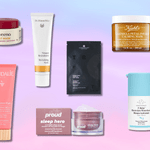5 myths and truths about moisturizers
Are all moisturizers created equal? Can you become addicted to lip balm? Read on for the answers to these and other myths and truths about moisturizers

Moisturizing lotion and lip balm are staples in many women’s beauty regimens. Many of us just slap them on without much thought’after all, skin cream is skin cream, right? We talked to Dr. Mark Lupin, a dermatologist and director of the Cosmedica dermatology centre in Victoria, B.C., about common misconceptions related to skin lotions and lip balms. Read this before your next trip to the drugstore or cosmetic counter.
1. Myth: All moisturizers are the same.
Truth: There are several types of moisturizers you can choose from, according to your skin’s needs. Humectants, such as glycerin and lactic acid, attract water and help skin retain moisture. Emollients, such as fatty acids and ceramides, soften and soothe. Occlusives (known as ‘barrier creams’), such as petrolatum, dimethicone or lanolin, leave a film on the surface of the skin and seal in moisture.
Most products contain a combination of humectants, emollients and occlusives, so it’s easiest to choose a moisturizer based on your skin type‘there are formulas for oily or acne-prone skin (look for ‘oil-free’ and ‘non-comedogenic’ on the label); sensitive skin; and dry or mature skin.
You’ll also notice that moisturizers have different textures. (Occlusives tend to be the heaviest of the bunch.) ‘Lotions are light, and creams are a little more substantial,’ explains Lupin. ‘For anyone with dry or extra-dry skin, you want something that has more substance’it’s better to use a cream, which tends to protect skin better than lotion.’
Skin tends to be drier in colder months, so use a cream in fall and winter, and switch to a lotion for warmer weather.
2. Myth: You need different moisturizers for different body parts.
Fact: Actually, this one is true. Lupin explains that while many moisturizers can be used on most of your body, you should invest in a couple of specialty creams, including a facial product. ‘The face is more prone to acne than the body, it’s going to have more sun damage, and eventually it could be an extra-dry area.’
He adds that your eyelids need a separate product. ‘Moisturizers for skin are not intended to be in the eye, and it’s easy to get it accidentally in the eye.’
And don’t forget about your extremities. ‘For people who have dry, cracked hands and feet, sometimes it’s worth having a special cream for those areas,’ says Lupin.
3. Myth: Your skin can become too dependent on moisturizer.
Truth: Some people believe that using lots of moisturizer can increase your skin’s need for the product. ‘Not at all,’ says Lupin. ‘Our skin cannot become dependent on a moisturizer. If you think your skin is dry, moisturizer is the best thing you can do for it.’
Wind, cold temperatures and heated houses in the winter can all dehydrate the skin, which can cause eczema to flare up and make the skin itchy and dry. ‘Prevention of this dryness by moisturizing is the single most important factor in protecting the skin from the elements,’ says Lupin.
4. Myth: You can get addicted to lip balm.
Truth: It’s been reported that some people claim to be addicted to lip balm, applying the stuff dozens of times a day. Can it happen? ‘My short answer is no,’ says Lupin, explaining that, as with skin lotions, using a lip balm won’t make your skin need more moisture.
If you find that applying lip balm actually makes your lips drier, the problem might be the formula you’re using. When choosing a product, ‘bland is better,’ Lupin advises, as some ingredients, such as menthol and eucalyptus, can be irritating. ‘It is not possible to become addicted to a lip balm, but if you are finding that your lips are stinging, burning or extra dry, or it seems the lip balm is only lasting a few minutes rather than an hour or longer, then consider switching to an alternate brand as you may be having a reaction to the one you are using,’ he suggests. ‘Generally, I avoid the ‘medicated’ balms as they are not necessary.’
Parched lips may also be the result of sun damage. In the summertime, people may think their cracked lips are chapped, but really, they’re sun burnt, says Lupin. The same thing may happen in the winter when you’re skiing at a high elevation, he adds. Guard against UV rays by choosing a lip balm with sunscreen in it.
5. Myth: If your moisturizer or makeup contains sunscreen, you don’t need any other protection.
Truth: There is a glut of skincare and cosmetic products that boast built-in sunscreen. Lupin cautions that you should read the fine print. Look for a formula with an SPF of 30 or higher make sure it is a broad-spectrum sunscreen, which protects against both UVA (which can cause cancer) and UVB rays. ‘As long as [the sunscreen in other products] qualifies in those two areas, then you don’t necessarily need another sunscreen on top of that,’ he says.
To ensure better protection, buy a sunscreen that moisturizes rather than a moisturizer with some sunscreen in it, Lupin adds.
Don’t miss out! Sign up for our free weekly newsletters and get nutritious recipes, healthy weight-loss tips, easy ways to stay in shape and all the health news you need, delivered straight to your inbox.




